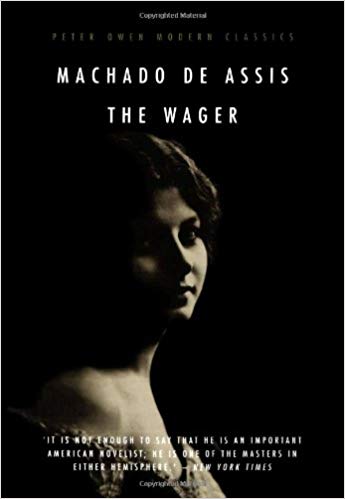
Brazil’s most famous writer, Machado de Assis, languishes in relative obscurity outside his native country, despite the best efforts of estimable champions of his fiction as varied as Susan Sontag, Woody Allen and Harold Bloom. Within Brazil, however, he’s inescapable: in 1897, he co-founded and served as the first president of the Brazilian Academy of Letters, which repaid the favor, decades after his death, by inaugurating the Prêmio Machado de Assis, Brazil’s most prestigious literary award. The Wager, titled Memorial de Aires in Portuguese, was the last of his works, published mere months before his death in 1908, and seems suffused with an air of finality and resignation.
The novel takes the form of a series of diary entries, written by a retired diplomat and widower, José da Costa Marcondes Aires, who has only recently returned to Brazil after a lifetime of work in Europe. “Here is where I am; here I live, and here I shall die,” Aires tells us in his first diary entry, and as if to drive this point home, the very next entry details his visit to the family vault in the local cemetery, in the company of his sister Rita, also a widow. In the distance, Aires spies a beautiful young woman – “pretty and extremely elegant” – praying at a nearby tomb. Rita informs him that her name is Fidelia, that she is the daughter of a wealthy baron, and that her husband died unexpectedly last year, shortly after a marriage that neither family approved of. Aires insists that a woman as young and beautiful as Fidelia will soon be remarried, but Rita takes the romantic position, insisting that Fidelia’s love for her husband was so great that she will prefer to remain a widow for the rest of her life. This is the “wager” of the title, though rather than play it for laughs, Machado forces Aires (and we readers) to confront its high stakes: if Aires wins his bet, even the deep love Fidelia (note the name!) had for her husband is merely transient, yet another thing in this world nullified by death. Two more characters, Dona Carmo and Aguiar, vie for Fidelia’s affections. They are an elderly couple who, owing to circumstance and bad fortune, never had children of their own, and now, in retirement, feel that emptiness keenly. To them, Fidelia is a surrogate daughter, and Fidelia – whose own mother is dead, and whose father refuses to speak to her since her marriage – returns the affection.
Nothing more dramatic than this happens in The Wager. The entire novel hinges less on plot than on the psychological observations of Machado de Assis, recorded by his imaginary diarist, as he contemplates the life he has lived and his impending death. We ache for him in his solitude, and can well understand why he would turn to a diary for an outlet:
Dona Carmo has her husband and her two adopted children. I have my wife under the ground in Vienna, while none of my children ever emerged from non-existence. I am alone, completely alone. Noises from the street – coaches, animals, people, bells, whistles – nothing of this has any significance for me. At most the clock on the wall chiming the hours seems to have something to say, but it speaks little, and in a dull, funereal voice. Re-reading these last few lines I feel like a gravedigger.
Even the abolition of slavery in Brazil, in 1888, merits little passing commentary, and serves more to demonstrate the kindness of Fidelia, as she opts to bequeath her inherited fazenda – the equivalent of an American plantation – to the slaves who worked it.
This is a subtle, short novel, but it amply demonstrates what Machado de Assis could achieve with the epistolary form. His diarist, Aires, succeeds in conjuring for us a lost world, Brazil at the close of the 19th century, and peopling it with believable characters, whose hopes and heartbreaks he lays bare for us. It is not, however, a redemptive or uplifting read.